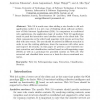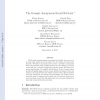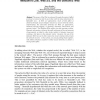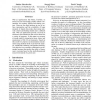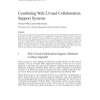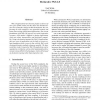129
click to vote
COMMA
2010
14 years 9 months ago
2010
Argumentative discussions are common in Web 2.0 applications, but the social Web still offers limited or no explicit support for argumentation. As Web 2.0 applications become more ...
142
click to vote
KSEM
2010
Springer
15 years 9 hour ago
2010
Springer
Web 2.0 is much more than adding a nice facade to old web applications rather it is a new way of thinking about software architecture of Rich Internet Applications (RIA). In compar...
127
click to vote
MIDDLEWARE
2010
Springer
15 years 16 days ago
2010
Springer
While social networks provide news from old buddies, you can learn a lot more from people you do not know, but with whom you share many interests. We show in this paper how to bui...
128
click to vote
WS
2008
ACM
15 years 2 months ago
2008
ACM
: The power of the Web is enhanced through the network effect produced as resources link to each other with the value determined by Metcalfe's law. In Web 2.0 applications, mu...
117
click to vote
WS
2008
ACM
15 years 2 months ago
2008
ACM
The World Wide Web (WWW) can be seen as an ideal platform for enhancing argumentative expression and communication, due to its ubiquity and openness. Much argumentation takes plac...
143
click to vote
LWA
2007
15 years 3 months ago
2007
Web 2.0 applications like Flickr, YouTube, or Del.icio.us are increasingly popular online communities for creating, editing and sharing content. However, the rapid increase in siz...
119
click to vote
MC
2008
15 years 3 months ago
2008
In the current discussion of the impact Web 2.0 may have on CSCW and Groupware research, Web 2.0 applications are often considered to be a substitute for Collaboration Support Sys...
IRI
2007
IEEE
15 years 8 months ago
2007
IEEE
Web 2.0 applications have become popular as drivers of new types of Web content, but they have also introduced a new level of interface design in Web development; they are focusin...
117
click to vote
ACSAC
2008
IEEE
15 years 8 months ago
2008
IEEE
Mashups are new Web 2.0 applications that seamlessly combine contents from multiple heterogeneous data sources into one integrated browser environment. The hallmark of these appli...
112
click to vote
EGOV
2009
Springer
15 years 8 months ago
2009
Springer
Abstract. Web 2.0 applications attract more and more people to express their opinions on the Web in various ways. However, the explosively increasing information in social web site...

